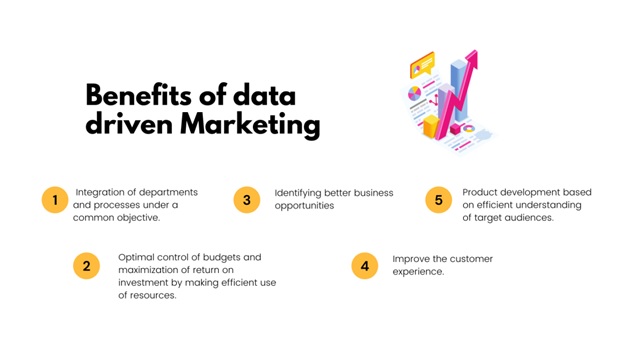Welcome to Ibex Analytics
- +14253899644
- 14121 Tukwila International Blvd, Tukwila WA 98168
- info@ibexanalytics.net
Welcome to Ibex Analytics

A marketing strategy known as “data-driven marketing” is a method that bases choices and the overall course of marketing campaigns on the findings and interpretations of data and analytics. Using a marketing strategy that is driven by data has a number of advantages, including the following:

1. Customer-focused marketing and advertising
The use of data to inform and direct marketing choices and actions is the cornerstone of the data-driven marketing methodology, which may be defined as an approach to marketing. It entails gathering and analyzing data on clients as well as trends in the industry, and then making use of that knowledge to generate customized marketing campaigns and plans. One of the primary advantages of data-driven marketing is that it helps marketers to tailor their marketing efforts and provide more relevant and effective message to their target consumers. This is one of the fundamental benefits of data-driven marketing. Data-driven marketers are able to design customized marketing campaigns by using client information such as demographics, interests, and behavior. These campaigns have a greater chance of resonating with their audience and driving results for their businesses.
2. Data science for customer analytics
In data-driven marketing, good consumer analytics need contributions from data science in a number of different ways, including the following:
Segmentation:
Methods from the field of data science, including as clustering and classification, may be used to divide clients into distinct categories on the basis of the traits and actions they exhibit. This gives advertisers the ability to adapt their marketing efforts to certain groups, enabling them to provide message that is more focused and relevant to those segments.
Personalization:
Data science may be used to construct models that anticipate the preferences and actions of customers. This provides marketers with the ability to tailor the content and suggestions they provide to customers.
Forecasting the churn:
The field of data science allows for the construction of models that can determine which consumers are most likely to defect (i.e., stop doing business with a company). This enables marketers to identify consumers who may be at danger of leaving and take preventative measures to retain such clients.
Prediction of the lifetime worth of a customer:
The use of data science to construct models that anticipate the lifetime worth of a client may assist marketers in more efficiently prioritizing their efforts and allocating resources.
Optimizing the experience of the customer:
Analyzing customer journeys and finding opportunities to improve customer experience may both be accomplished with the help of data science. This might be helpful to marketers in identifying places of friction in the customer journey and taking actions to enhance the experience for the consumer.
3. Customer analytics may assist with strategy, customer retention, and churn
Customer analytics achieved via the use of data science may be of great assistance in the process of data-driven marketing for a number of reasons:
Strategy:
Marketers may design plans that are more successful by gaining a more in-depth knowledge of their target audience via the analysis of data collected from their customers. For instance, data science may be used to assist in the identification of significant consumer segments, the comprehension of those segments’ requirements and preferences, and the development of tailored marketing strategies to reach those segments.
Client retention:
The field of data science allows for the construction of models that can determine which consumers are most likely to defect (i.e., stop doing business with a company). This enables marketers to identify consumers who may be at danger of leaving and take preventative measures to retain such clients. Data science may be used, for instance, to find common traits among customers who churn, such as a lack of interaction with marketing initiatives or a bad customer experience. Another use of data science is to determine why consumers churn. The retention of customers may be improved if marketers focus on solving these challenges.
Reduced customer turnover:
Data science may be used to establish methods to prevent churn, in addition to assisting with the identification of customers who are at danger of leaving. Data science may be used, for instance, to investigate the paths taken by customers and identify areas in which improvements can be made to their overall experience. This might be helpful to marketers in identifying places of friction in the customer journey and taking actions to enhance the experience for the consumer. Marketers can boost customer loyalty and decrease customer turnover by working to improve the whole customer experience.